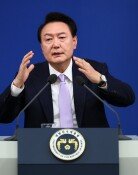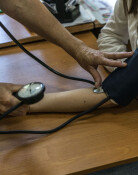Rising Oil Prices Slowing Koreas Economic Growth
Rising Oil Prices Slowing Koreas Economic Growth
Posted October. 29, 2007 03:32,
There is a growing concern that record high oil prices and the 10-year high of local currency against the dollar will have a negative impact on the Korean economy.
In particular, many economic experts say the recent trend of oil price hike and the won-dollar exchange rate will continue into next year, and the government estimation of next years economic growth of 5 percent would not be easy to achieve. They stress that the new administration, which will take office early next year, should carefully look at the possibility of economic instability and come up with efficient countermeasures.
With the dollar remaining low, the won closed at 909.9 won to the dollar, the highest level in a decade. If the U.S. further cuts its interest rates at the end of this month, it would facilitate the weakening of the dollar, pulling down won-dollar rates below 900 to the dollar.
Some argue that further strengthening the won would deal a severe blow to the domestic exporters. According to a survey conducted by the Federation of Korean Industries on October 28 of the top 600 domestic businesses in terms of sales revenue, as many as 27 percent of companies responded that the won-dollar rates range between 900 and 910 won is Koreas final profit margin.
On the same day, the Hyundai Economic Research Institute (HERI) also said, The slump in the U.S. housing market could dampen consumer spending, and continual interest rate cuts could reduce capital flows to the U.S., precipitating a weak dollar down the road. It is likely that further falls in the value of the dollar will continue at least into the first half of next year.
Uncertainty in the exchange rate and rising tensions in the Middle East, along with winter supply worries, have pushed oil prices to new highs.
The Korea National Oil Corporation said as of October 26, Dubai crude oil reached a record high of $82.60 per barrel, a 2.07 dollar increase from the day before. West Texas Intermediate also closed at $91.86 per barrel, up 1.40 dollar, on the New York Mercantile Exchange, setting a new record.
In last September when it laid out the national budget for next year, the government predicted oil prices next year would remain around $60 per barrel, and that the won-dollar rate would hover at around 920 won to the dollar, estimating that the country would record 5-percent growth.
Private think tanks also forecasted that the potential economic growth rate for next year would be around 5.0-5.1 percent. The Korea Economic Research Institute and Hyundai Research Institute predicted that the growth rate would be around 5.1 percent while the KDI, ERI and LG ERI put it at about 5.0 percent.
However, many experts say that skyrocketing oil prices and the weak dollar will put a damper on the 5 percent economic growth rate forecasts. The Bank of Korea estimates that the GDP falls 0.02 percentage points when oil prices rise 1 percent.
The Bank of Korea estimated that the economy would grow at 4.5 percent this year. The estimation was based on the outlook that the international oil price would be $64. However, currently, Dubai crude oil prices remain at $82.60 per barrel, an 18.60 dollar increase (29 percent) from bank estimates.
If the current rates continue next year, the nation will see its economic growth rate fall about 0.6 percent. In other words, the nations real economic growth rate would be adjusted to 4.4 percent, a decline of 0.6 percent from the originally expected 5 percent growth.
Kim Jeong-shik, an economics professor at Yonsei University, said, In order to cushion the external shock, the government should provide more flexible economic policies, such as the reduction of oil taxes. The new administration also needs to bring about new changes in the overall economic environment by carrying out business-friendly policies.







